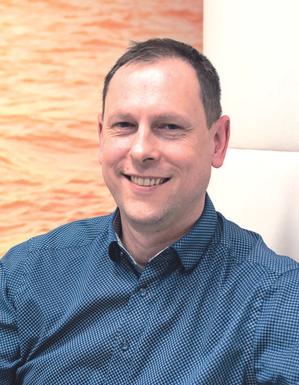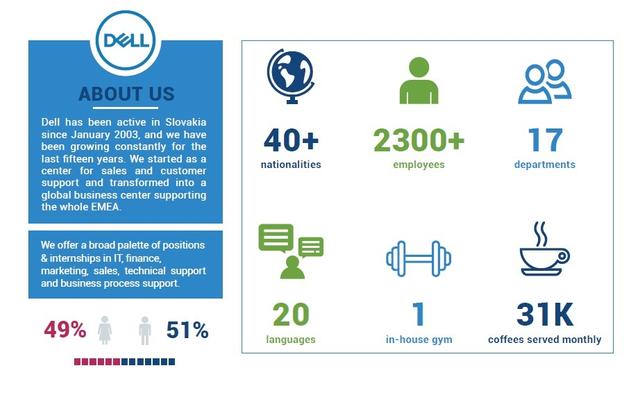This story is not about a super successful Slovak student who graduated from Harvard. Martin Bednár was a regular student studying at the University of Economics in Bratislava. Just like many other young people today, in his free time he went for a run in the Mountain Park district of Bratislava (Horsky park), used to hang out with friends and made some extra money harvesting strawberries in the UK in the summer.

His first job after graduating from university was not his dream job, but it helped him get a job in a top tech company. Today he’s in charge of the Financial Planning and Analyses for the Client Solutions Group at Dell. We interviewed and asked Martin what he thinks of the fact that his boss didn’t graduate from university.
Martin Bednár graduated from the Faculty of Economic Informatics at the University of Economics in Bratislava. After school he got a job at Danone as an analyst and climbed up the ladder to become the Head of Finance Controlling department. Today he’s in charge of the Global Financial Planning and Analyses for the Client Solutions Group. He’s also leading Dell Finance Centre in Bratislava.
Do you remember your graduation ceremony?
Barely. It was not a big deal, unlike the graduation parties in the States. The ceremony took place in the Istropolis Center and I was awarded a red diploma, meaning I had straight As throughout my university studies. I’ve got a videotape recording of it. But first I would need to borrow a VHS player from a museum to play it. This coming summer we’re going to have a classmates’ reunion after 20 years so for sure we’ll discuss and remember many things.
Was university different back in the old days?
Back then we didn’t have so many opportunities to travel abroad. I only studied in Bratislava and during summer breaks I worked in the UK.
What did you do in your leisure time?
I lived in a student dormitory in Mountain Park (Horsky park) district. We played basketball all the time. I started to work part-time during my third year of university and had a full time job in my fifth, graduation year. In the summer I traveled to the UK to harvest strawberries to learn some English, but we ended up learning Polish and Bulgarian instead.
When you look back at your university studies, what benefited you most in your career?
I studied operational research and econometrics. I was really fond of mathematical models used in economics. I didn’t need to learn anything by heart because it was all basically math. Once you understood how it worked, you could pass an exam without needing to cram for it. Thanks to this approach I understood the basics of economics and business finance in the first years. Later on it was more about logical thinking and opening up your brain, which is really important to me.
Although only indirectly, I did benefit from my studies. I used something from those theoretical models once in my life and it was straight in my first job. I was very ambitious. After I was two months on the job, I used a super complicated mathematical model to plan cost. When my boss looked at it, it occurred to me that in real life I will survive with the plus and minus signs and some multiplication and division operations.
Companies oftentimes complain that students learn nothing in school. Have you ever experienced the opposite? Were you surprised by a new employee’s knowledge gained at school?
I am seldom impressed by someone’s academic knowledge. When I look at the students who join Dell, they are certainly interesting due to their ability to search for information and cooperate with others. They are much more experienced in social skills than we were after school thanks to the contacts from spending time abroad and on the Internet. To me, young people today are more complex and more interesting.
Many top tech visionaries have not completed college, including Michael Dell. Does it make sense to study university in your opinion?
I think it does, because for one successful Michael Dell you have 200 thousand unsuccessful people who didn’t complete their studies and never achieved anything. It makes sense to study mainly because it develops one’s personality. If someone is interested in a career in a corporation, university is definitely a big benefit especially at the beginning.
Despite that we do have people without a university degree working for us, even on managerial positions, and it’s not a problem for either them or us. The way it works in our company, initially university helps, but after 4 or 5 years of practice academic achievements aren’t a priority and it doesn’t matter anymore who graduated or not or from which university. We have people without a background in finance in our Finance Department. And in Marketing there are people who never studied marketing.
When Dell first opened in Slovakia, the perception was that only German speaking people had a chance of getting a job. How much German do you speak? Is German still needed today?
My German is good enough only to order food and drinks in Austria (a big laugh). In our Bratislava center German is needed only in some specific departments. And not even in the entire department. Out of 2,300 people there are only several dozen positions where German is required. For most positions English is the primary language. When you want to work in Finance, for instance, all you need is English. And that’s it.
In Bratislava there is a large Dell Finance Division. Don’t financiers feel a bit lost in a tech company?
Actually, Finance has a very strong position in Dell. Finance is not just about accounting, i.e. counting money and filing tax returns. Finance is very closely linked with business in our case. Most important people in our company are the General Manager and the Finance Manager. Guys from Finance are always involved in key decisions. Michael Dell is the CEO of course, but on a daily basis operations are managed by Jeff Clarke who is the President for Products and Operations and by Tom Sweet, the chief financial officer. They’re in charge of everything that happens in our business, all strategic as well as operational decisions. This is true despite the fact that we’re a tech firm.
Nowadays people prefer jobs where they can come up with something new and innovative. Can one be innovative in the Finance Department?
Bratislava is the most important finance hub for Dell. Bratislava is involved in everything that’s happening at Dell on a global scale. Bratislava was the venue of the Dell / EMC financial integration. New tools are developed and introduced in Bratislava before they’re implemented elsewhere. If a new process needs to be invented, if a problem needs to be solved, very often it’s done here. Since we are in a company with access to all imaginable technologies, we can access them, too. We are far more than just a Slovak branch that nobody has ever heard of.
Have you ever met Michael Dell in person?
I spend several weeks in Austin, Texas each quarter and I’ve met him several times. Michael even came to Bratislava several years ago. But like I’ve explained before, Michael doesn’t manage the business by going to work every day, he doesn’t sit in the office or deal with operations. Tom and Jeff are in charge of these issues. I meet them at least once a month. Many people here in Bratislava have access to the top management.
Do you also have access to tech novelties before they’re launched in the market?
To me, tech novelties include a lot of things. Dell stands for much more than just consumer electronics. We don’t have a tech center in Bratislava, but when I’m in Austin, I like to visit our design center, where novelties are developed over a period of three or even four years. Many of our innovations are in the enterprise technologies sector: servers, networking, storage. This equipment is so sophisticated that you get lost in 30 seconds when someone is talking about it.
You work with various nationalities. Can one learn a new language on the job?
Five to seven percent of our colleagues in Bratislava are not Slovak. If you want to make friends and speak their language, of course you can do it. But I don’t think the language sticks to you so easily. When there is someone who doesn’t speak Slovak in our group, we encourage everyone to speak English. We don’t want anyone to feel excluded.
Global companies tend to display various fun and relaxing activities on the job to the extent one gets the feeling that people are just playing at work. Do you have time to also work at Dell?
Our job is fun and play to us (he laughs). But seriously, I think our job is interesting but also demanding. It is therefore important to have opportunities on the job to relax and take a rest for a moment. To different people this means different things of course. Some need to work out, others like gaming or they go for a coffee with their colleagues. We have a fitness center and a gaming center and a cafeteria right in our building. If you visit our fitness center now in January and February, it’s always packed.
The media write a lot about how the young generations, the millennials and the Z generation differ from those born before them. Are the differences indeed so striking in your opinion?
Like I’ve said before, in my opinion, graduates today have broader perspectives, more opportunities and different priorities in life. There are certainly differences. The average age of our employees is relatively low. If the average is let’s say 30 years, young graduates can fit in easily. Although there are differences, at the end of the day everyone is looking for similar things on the job. People want to have a job they enjoy, they want to work in a team with a positive climate and they want to do something that has an impact on the company. These are the same things I wanted to do when I first started to work for Dell. And I think young people today still want the same things.
Last question. How good are you at understanding the language of the younger generations. They use so many English acronyms. Do you know e.g. what XOXO stands for?
Honestly, for a long time I didn’t know. But now I know that it stands for hugs and kisses. I did know a few acronyms before, such as LOL, but XOXO is quite new to me.
Are you going to use it?
(Laughs) No.
How to make a good use of your university degree?
We are continuously looking for young talents to help us grow our business. At Dell Bratislava Global Business Center you can meet inspiring leaders and team members, build relationships and become a part of challenging and interesting projects that have an impact on the Company’s future development. We provide students and recent graduates with multiple opportunities to join our business via:
Internships for university students in daily programs
Rotation and development programs for graduates
Full-time employment for graduates
Internships
We have over 60 interns working in various departments (Marketing, Finance, HR, Sales, IT, Data Science, etc.) and we’re looking for the next enthusiasts who want to start their careers at Dell.
Finance Graduate Program
Finance Graduate Program focuses on recent graduates of finance or economics. It has been around at Dell since 2006. Program participants undergo several training sessions, gain experiences in finance and commerce, work with various financial systems, enhance their communication, presentation and technical skills.
Marketing Graduate Program
As a member of the Marketing Graduate Program you will work in EMEA Client Solutions Center of Competence, which is a key contributor to the computer portfolio growth strategy in the region.Throughout the duration of the Program you’ll be in charge of product pricing and Dell solutions pricing for the EMEA Region (Europe, Middle East and Africa) as well as market development identification.
Do you want to become a member?Join us to play a key role in our business’s continued success. Take advantage of an opportunity to learn, grow and become successful through our development program aimed at students and graduates. Register at:

 Martin Bednár
Martin Bednár
